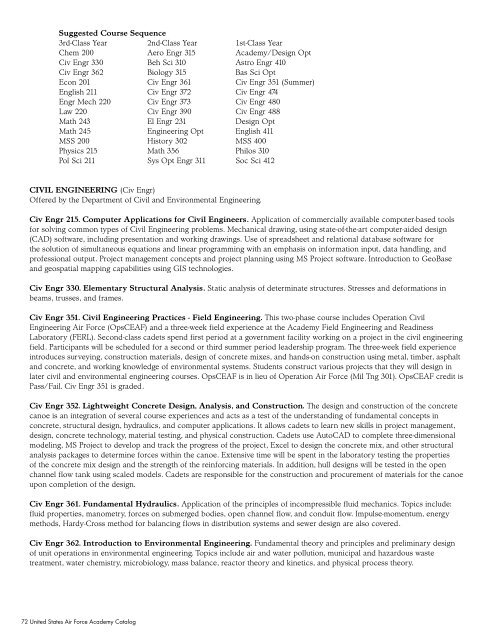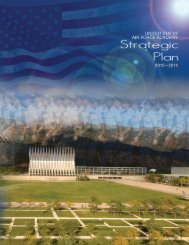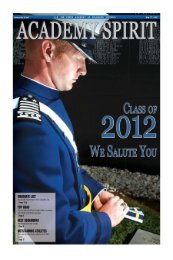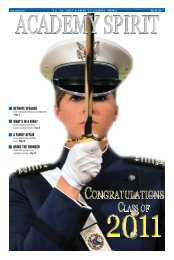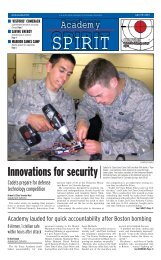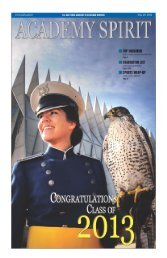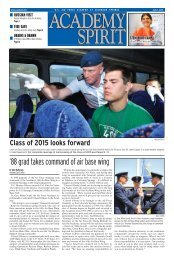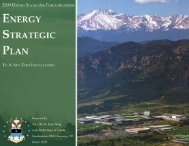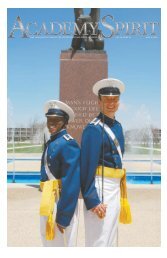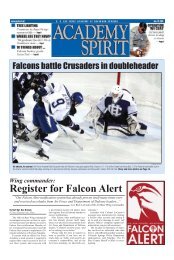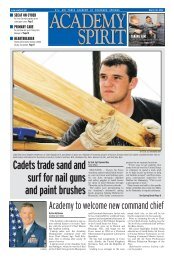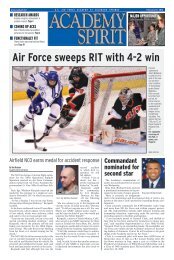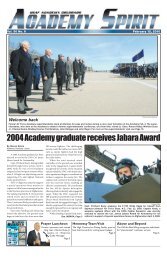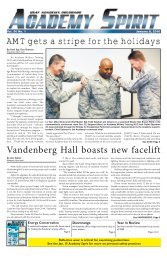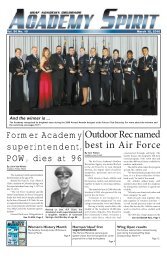2008-2009 Catalog - United States Air Force Academy
2008-2009 Catalog - United States Air Force Academy
2008-2009 Catalog - United States Air Force Academy
You also want an ePaper? Increase the reach of your titles
YUMPU automatically turns print PDFs into web optimized ePapers that Google loves.
Suggested Course Sequence<br />
3rd-Class Year 2nd-Class Year 1st-Class Year<br />
Chem 200 Aero Engr 315 <strong>Academy</strong>/Design Opt<br />
Civ Engr 330 Beh Sci 310 Astro Engr 410<br />
Civ Engr 362 Biology 315 Bas Sci Opt<br />
Econ 201 Civ Engr 361 Civ Engr 351 (Summer)<br />
English 211 Civ Engr 372 Civ Engr 474<br />
Engr Mech 220 Civ Engr 373 Civ Engr 480<br />
Law 220 Civ Engr 390 Civ Engr 488<br />
Math 243 El Engr 231 Design Opt<br />
Math 245 Engineering Opt English 411<br />
MSS 200 History 302 MSS 400<br />
Physics 215 Math 356 Philos 310<br />
Pol Sci 211 Sys Opt Engr 311 Soc Sci 412<br />
CIVIL ENGINEERING (Civ Engr)<br />
Offered by the Department of Civil and Environmental Engineering.<br />
Civ Engr 215. Computer Applications for Civil Engineers. Application of commercially available computer-based tools<br />
for solving common types of Civil Engineering problems. Mechanical drawing, using state-of-the-art computer-aided design<br />
(CAD) software, including presentation and working drawings. Use of spreadsheet and relational database software for<br />
the solution of simultaneous equations and linear programming with an emphasis on information input, data handling, and<br />
professional output. Project management concepts and project planning using MS Project software. Introduction to GeoBase<br />
and geospatial mapping capabilities using GIS technologies.<br />
Civ Engr 330. Elementary Structural Analysis. Static analysis of determinate structures. Stresses and deformations in<br />
beams, trusses, and frames.<br />
Civ Engr 351. Civil Engineering Practices - Field Engineering. This two-phase course includes Operation Civil<br />
Engineering <strong>Air</strong> <strong>Force</strong> (OpsCEAF) and a three-week field experience at the <strong>Academy</strong> Field Engineering and Readiness<br />
Laboratory (FERL). Second-class cadets spend first period at a government facility working on a project in the civil engineering<br />
field. Participants will be scheduled for a second or third summer period leadership program. The three-week field experience<br />
introduces surveying, construction materials, design of concrete mixes, and hands-on construction using metal, timber, asphalt<br />
and concrete, and working knowledge of environmental systems. Students construct various projects that they will design in<br />
later civil and environmental engineering courses. OpsCEAF is in lieu of Operation <strong>Air</strong> <strong>Force</strong> (Mil Tng 301). OpsCEAF credit is<br />
Pass/Fail. Civ Engr 351 is graded.<br />
Civ Engr 352. Lightweight Concrete Design, Analysis, and Construction. The design and construction of the concrete<br />
canoe is an integration of several course experiences and acts as a test of the understanding of fundamental concepts in<br />
concrete, structural design, hydraulics, and computer applications. It allows cadets to learn new skills in project management,<br />
design, concrete technology, material testing, and physical construction. Cadets use AutoCAD to complete three-dimensional<br />
modeling, MS Project to develop and track the progress of the project, Excel to design the concrete mix, and other structural<br />
analysis packages to determine forces within the canoe. Extensive time will be spent in the laboratory testing the properties<br />
of the concrete mix design and the strength of the reinforcing materials. In addition, hull designs will be tested in the open<br />
channel flow tank using scaled models. Cadets are responsible for the construction and procurement of materials for the canoe<br />
upon completion of the design.<br />
Civ Engr 361. Fundamental Hydraulics. Application of the principles of incompressible fluid mechanics. Topics include:<br />
fluid properties, manometry, forces on submerged bodies, open channel flow, and conduit flow. Impulse-momentum, energy<br />
methods, Hardy-Cross method for balancing flows in distribution systems and sewer design are also covered.<br />
Civ Engr 362. Introduction to Environmental Engineering. Fundamental theory and principles and preliminary design<br />
of unit operations in environmental engineering. Topics include air and water pollution, municipal and hazardous waste<br />
treatment, water chemistry, microbiology, mass balance, reactor theory and kinetics, and physical process theory.<br />
72 <strong>United</strong> <strong>States</strong> <strong>Air</strong> <strong>Force</strong> <strong>Academy</strong> <strong>Catalog</strong>


